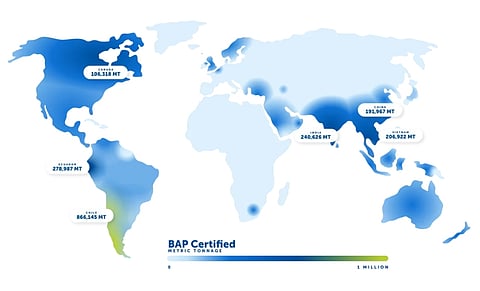

Illustration of Global Impact in 2024 by BAP-certified metric tonnage, from the GSA Annual Report.
Image: Global Seafood Alliance
The Global Seafood Alliance (GSA) has released its 2024 Annual Report, highlighting efforts which it says are driving "measurable change" in responsible seafood production worldwide.
The organisation ended 2024 with 4,168 certified facilities across 45 countries, representing a 5% increase compared with the previous year and an 88% retention rate.
Its membership community also continued to grow, encompassing more than 8,500 individuals and over 35 corporate members, with an 82% renewal rate. The report’s new data, GSA said, provide valuable benchmarks for producers and supply chain partners seeking to measure and improve their performance.
Mike Kocsis, who was appointed CEO of the GSA in April 2024, welcomed the data, arguing that “Growth for our program simply allows greater opportunity to extend a positive impact.”
“The global seafood industry can have a positive and lasting impact on food security, human health and nutrition, markets and economies and, of course, the environment, if its work is done responsibly. And a combination of passion, patience and collaboration can result in meaningful change – I see it every day at GSA," Kocsis said.
Amongst the new companies certified in 2024 were Faroese salmon farmer Hiddenfjord, which became the first company in the Faroe Islands to attain BAP four-star certification, and seafood supplier Wright Brothers UK.
While the statistics remain an important benchmark for the GSA, the organisation's latest annual report goes beyond tracking certification numbers to explore how collective action, education and advocacy are driving improvements throughout the seafood value chain.
For the first time, the report includes a "Global Impact" section that links GSA’s work on certification, training and outreach to broader global challenges such as food security, nutrition and sustainable development. The GSA said this new section demonstrates how certified facilities, educators and advocates are collaborating to advance responsible seafood practices that contribute to resilient food systems worldwide.
The report also expands on the "Demonstration" section, adding data on certified operations such as measurable improvements achieved, renewal and retention rates, and detailed breakdowns across farms, hatcheries, feed mills and processing plants. These insights, the alliance claims, strengthen transparency and help identify opportunities for continuous improvement within the sector.
The full 2024 Annual Report can be accessed via the Global Seafood Alliance website.
The GSA and its Best Aquaculture Practices (BAP) certification programme were recently recognised by the Food and Agriculture Organization of the United Nations (FAO), as part of the agency’s first Global Technical Recognition for Sustainable Aquatic Food Systems.
GSA and BAP received the accolade for contributing to FAO’s “four betters” - "better production, better nutrition, a better environment and a better life", in a ceremony that also recognised the achievements of 45 other organisations for their "outstanding contributions to sustainable fisheries and aquaculture".
